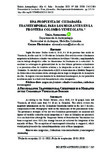Una Propuesta de Ciudadanía Transtemporal para los Migrantes en la Frontera Colombo-Venezolana
Fecha
2023-11-13Autor
Palabras Clave
Migración, Frontera colombo-venezolana, Ciudadanía transtemporalMigration, Colombian-venezuelan border, Transtemporal citizenship
Metadatos
Mostrar el registro completo del ítemResumen
Según Naciones Unidas desde el 2010, 6,4 M de personas han salido de Venezuela. 5,6 M venezolanos están en América Latina y el Caribe, de ellos más de 2,4 M están en Colombia. Este artículo inicia revisando el fenómeno migratorio en la frontera colombo-venezolana en las últimas 5 décadas, que luego es complementado con un trabajo etnográfico sobre las dimensiones del fenómeno en la actualidad. Se analizan además las estrategias de gobernabilidad de los dos últimos gobiernos colombianos y se presentan cifras de algunas variables relativas a la integración social recogidas en 5 ciudades de Colombia. Se concluye que si bien desde el año 2021 se ha reconocido el Estatuto Temporal de Protección a venezolanos -ETPV- dicha estrategia aún no logra la integración de la mayoría de ellos. Se sugiere el reconocimiento de la ciudadanía transtemporal, la cual permitiría resolver en parte la actual crisis humanitaria de estos inmigrantes.
Colecciones
Información Adicional
| DOI | https://doi.org/10.53766/BA/2023.02.106.02 |
| Otros Títulos | A Proposal for Transtemporal Citizenship for Migrants in the Colombian-Venezuelan Border |
| Correo Electrónico | alexandra.uran@udea.edu.co |
| ORCID | https://orcid.org/0000-0002-6835-4839 |
| ISSN Electrónico | 2542-3304 |
| Resumen en otro Idioma | According to the United Nations, 6.4 million people have left Venezuela since 2010. 5.6 M Venezuelans are in Latin America and the Caribbean, of which more than 2.4 M are in Colombia. This article begins by reviewing the migration phenomenon in the Colombian-Venezuelan border in the last 5 decades, and then complements it with an ethnographic work on the current dimensions of the phenomenon. It also analyzes the governance strategies of the last two Colombian governments and presents figures on some variables related to social integration collected in five Colombian cities. It is concluded that although the Temporary Statute for the Protection of Venezuelans -ETPV- has been recognized since 2021, this strategy has not yet achieved the integration of most of them. It is suggested the recognition of transtemporary citizenship, which would allow to solve in part the current humanitarian crisis of these immigrants. |
| Colación | 215-254 |
| Periodicidad | Semestral |
| Página Web | https://saber.ula.ve/boletin_antropologico/ |
| País | Venezuela |
| Institución | Universidad de Los Andes |
| Sección | Boletín Antropológico: Artículo de Investigación |






